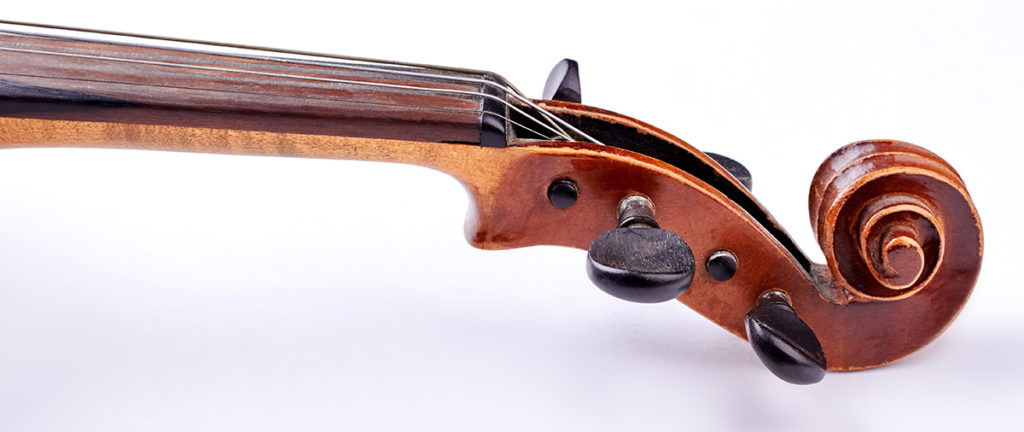Why Do the Pegs On My Cello Slip?

Traditional wooden pegs are a friction fit. On a well set up cello, they should turn smoothly and easily (although some strength is required) and should stay put! The simple fact is that they can and do slip which can be very frustrating. Let’s look at why this happens and how to remedy it – but first off, if you have bought a cheap internet Cello, nothing will help until it is properly set up by an expert using the correct tooling.
The pegbox holding the pegs contains four peg holes. These are tapered to fit the peg which is machined and cut to fit exactly. The Cello strings are wound onto these pegs by turning the peg clockwise. Thus far the obvious. If for any reason the peg slips, your first port of call is to re-tighten the string by turning the peg with a gentle ‘inward’ pressure to engage the whole surface of the peg with the peg hole. Often this is all that is needed.
Still slipping?
Low Humidity or Dry Conditions
This is the most common cause for slipping pegs. Wooden pegs go through many changes—high humidity can cause them to swell and stick in place, and low humidity can cause them to shrink and lose their grip in the pegbox. The solution is to humidify the Cello using a Dampit or similar and store your Cello in a room with 40-60% humidity. You can also try using a good peg paste such as ‘Hill’s peg compound.’ Unwind the string from one peg at a time, remove it from the pegbox, and apply a thin line of peg paste where it makes contact with the pegbox. Return it to the pegbox and turn it a few times to work the paste in, and then re-install the string and tighten to pitch.

We now discuss why pegs slip and the remedy, which unfortunately will usually mean a visit to your Luthier or Cello shop.
Badly setup Cellos
Badly setup cellos or wear due to normal tuning after a period of time can cause pegs to go out-of-round. A peg which has gone oval-shaped will resist turning smoothly and obviously on the flat spot will constantly slip. The only remedy is to re-fit the pegs. This is a job for an expert luthier.
String hole is too close to the pegbox wall
This is a problem of wear and tear. As the pegs wear and are pressed further into the pegbox, the tiny hole that takes the string gradually moves inward finally causing tension and slipping. Again, the pegs need to be re-fitted or re-drilled – if there is enough peg life left.
The string is wound too close to the pegbox wall
While it is very necessary that the strings are wound carefully without overlapping towards the edge of the pegbox – if this is too close and tight it can cause the slippage. Restring the peg so that the coils are a fraction away from the inside edge of the pegbox.
The string is making contact with another peg
This problem is likely to happen only with the strings further up in the pegbox, the G and D. This is again usually due to a faulty or cheaply made instrument where the pegs are out of alignment and are too high or too low in the pegbox. The clearance on the C and A is reduced and the G and D rub across the pegs. This will need expert help. If the instrument is of any value and the problem has arisen due to time and wear, the existing peg holes can be re-bushed and re-aligned, but that is an expensive option.
Badly fitted strings
Strings that have been wound on in a haphazard fashion, overlapping and crossing over will cause tensions which lead to slipping. A large gap between the final wind of the string and the inside edge of pegbox can have the same effect. Re-string taking care to have the coils neatly side by side moving towards the inner cheek of the pegbox
One final word. Most Cellos are fitted with fine tuners on the tailpiece end which greatly facilitates the tuning process. If the pegs are not regularly used, however, they may freeze and be very difficult to move should the need arise. A very professional solution is to have your luthier fit a set of Wittner fine-tune pegs. These look identical to an ordinary peg but are geared internally so that the actual peg never moves but the string can be tuned with no possibility of slipping.
Lance



